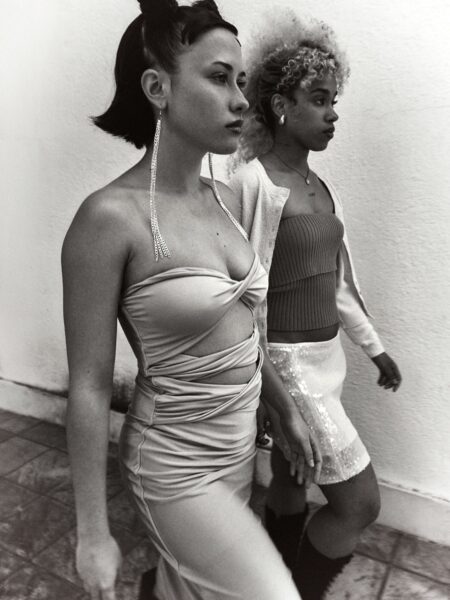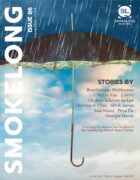Karina and I didn’t like the work. And we didn’t like our bosses. And we didn’t like to talk about love unless there was pain involved, otherwise we found it so uninteresting.
She liked to say things plainly. She called the runway soul-eroding, laughing. I said we were girls made of limestone, our faces glossy on magazine paper, our spines indented with tragedy. She liked to talk about forgiveness and I never chose to. Before shows we would touch each other’s collarbones before shows, spotted with malnutrition the color of organs or raspberry preserves, still laughing. We started young, open mouthed, winners of a beauty contest, already forced memorabilia. We received cash prizes and propulsion and invitations to top agencies where we were signed and cattled and written over and taken to parties and bedecked and sold and dressed like sacrificial lambs and luxurious house cats. We would say things to each other like,
I like that dress better and and that makeup and I have you, I’ll always have you and three hundred dollars and for him? And it’s easier to be tender when we realize we have no choice, isn’t it? Laughing still, most of the time.
In the days before the hospital, before I tried to speak, we used to try on each other’s outfits. Whenever she slipped from the gauze, a movement like fragrance and wafting, I imagined selkies, beautiful ocean monsters who shed their skin on land. I thought of Karina as one, watching her through webbed light, and had the thought that if needed I’d hide her tail so that she would not be able to return to the sea, that I’d try to wear it, slipping animalistic over plain bones and plain skin. She smiled with hair the color of weak tea, her mind a tourist attraction as much as the runway, her body, ritualistic, painted. She was two years older than me but I started work first so I was her senior, even as children. When we met she tried to think of me like a little sister but noted the untruth of this almost immediately. I was more exhausted than her. And she wore soft colors and platitudes while I did the show’s hardened signature looks. She began to look older to me only after I was sent away, my life dissolved into a forced documentary of romanticized pain. How typical we probably would have said together to this all boiled down to a game of movement. No sharp objects, no shoelaces. I wrote her letters, using the side of a spoon to cut through meat. I took pills in front of doctors, most of the time they stuck in my throat, felt like a second skin, punishment, a reminder of the body. How typical, Karina and I would have said, to our forced silence, to the linen beds, how typical.
Before the hospital, when we worked together, Karina always spoke to the cameras. She would smile to the sides of runways, offer her voice for our entire group, her teeth the color of chrysanthemum, deadened white by the runway lights. In these interviews, she spoke about the glamor and immaculateness of parties and fashion and indulgence, myself and the rest of the models flitting by on the sidelines, eyeing the camera and shifting away. I was worth the most and she was the second. At parties, I would be told to entertain the politicians and she the celebrities. We would try to laugh about it all the mornings after as we pored over our pictures in magazines.
It’s really so simple, all of this. She liked to say, still smiling. And it’s so terrible.
When the agency sent me away, when I tried to speak, I clung to her memory alone, no other extravagances or indulgences. Our boss claimed that I was suicidal, true, that I had attempted suicide, untrue, that I was very sick and had been sick for a long time and the lies and accusations said by me unto him and the company and the celebrities and the politicians were unfounded and incorrect, untrue. There, I began to have this dream where instead of being signed we just went missing, me and Karina. In the dream I re-crafted our childhoods by pulling our own bodies apart. I crafted us becoming infants by breaking apart our hands, creating something soft and cradled and sweet. I imagined us as dolls in a dollhouse, in adult’s fingers. I imagined taking my own ribcage out and using it as a foundation, my stomach lining like carpet. I imagined us gorging ourselves with the goodness I’d chosen. I picked pills out of toilet water. I imagined a house in Europe we would never see, the entire space around me a room with no doors. She called me only once, and into the phone she told me, I can’t speak now, no one will listen, but I will, I promise I will too. Then, I love you. Then, I want it to be over. Then, I want us to survive this and I want the world to begin and end and begin and end with the knowingness that we told the truth and that is something they cannot say and something they have never lived for and I want to find another world one day where we were all children with faces that will be forgotten, that will remain hidden. Then, it will be like nursing blood from a wound, it will be like staring into the sun. In twenty years we are going to be alive and in twenty years we will be forgiven. She spoke like she was clinging to my hands, I pictured her with bruised collarbones, I am just telling you what is going to happen. I am just telling you the truth.



 The SmokeLong Grand Micro Contest (The Mikey) is now an annual competition celebrating and compensating the best micro fiction and nonfiction online.
The SmokeLong Grand Micro Contest (The Mikey) is now an annual competition celebrating and compensating the best micro fiction and nonfiction online.